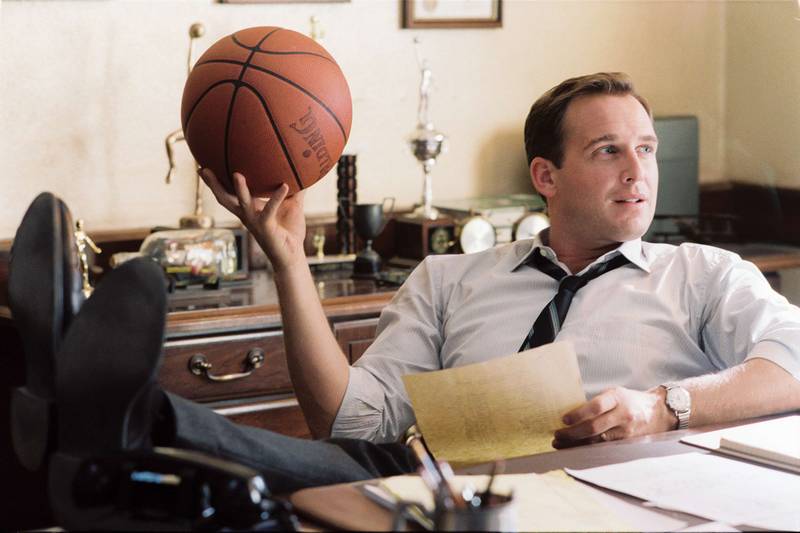Q: Re: “Glory Road” and coach Don Haskins. Thought you would be interested to know that Mr. Haskins received roughly $375,000 for the movie. The players received about $7,500 apiece. When Haskins found out how little the players received, he insisted that his portion be divided evenly amongst all. Everyone then received roughly $37,000, including Mr. Haskins. What a man. Leta Mohrman, El Paso, Texas
A: His decency is clear in the movie. I also heard from Rob Reed of Bloomington, Ind., whose father, Neil, was the assistant to Kentucky coach Adolph Rupp at the time of the famous 1966 NCAA championship game. Rupp (played by Jon Voight) comes over well in the film, his wife extends kindness to Mrs. Haskins, and the end titles observe that the next season, Rupp recruited the first black player in Kentucky’s history.
There was more to it than that, Reed writes me: Rupp and his father “were trying to integrate the team, much to the chagrin of segregationists of all types, including the board of trustees at the university (who eventually forced out Rupp on the pretense of his being at retirement age, despite his having the best win/loss record in college basketball history).”
There were death threats, Rob Reed writes, and the FBI was called in; there is a television news documentary about this period at www.wkyt.com. Reed closes: “It’s a wonderful thing to have pride in the raw honest courage of one’s father.”
Q. I was put off by your opening sentence: “I don’t know what I’m supposed to feel during ‘The Squid and the Whale,'” Huh? Shouldn’t you be asking what you are supposed to think during the film? I don’t read your film reviews to better understand what makes Roger Ebert tick. To dismiss the point of view of this film because you, personally, wish you had had “cool” parents just like these kids is a dumbing-down of your role as a critic.
What I wish you had reviewed was a film that thoughtfully explores the unintended consequences of divorce in a culture that collectively and individually tries to assuage its guilt about the effects, particularly on children. Divorce, like death, may be a part of life that we have no choice but to accept, but prevalence alone does not mitigate the affects of divorce on the children who are the civilian casualties. Jane Levin Kroboth, Charlottesville, Va.
A. You make a good point about the underlying subject of the film. But I think “feel” is the correct word. Movies are essentially a medium of emotion. Intellectual arguments are more suited to the written word; movies persuade us not by what they argue, but by how they make us feel.
One purpose of a critic is to be open about exactly what he or she actually felt, instead of retreating into abstractions. When I saw “The Squid and the Whale,” I was not thinking about the unintended consequences of divorce; I was thinking that for all its faults, the family functioned pretty well to produce useful and creative children, including the director of the film.
By the way, in that review, I quote the father telling his son that A Tale of Two Cities is “minor Dickens,” to which I added: “Which is correct.”
Lee Granas of St. Louis writes me: “Why is A Tale of Two Cities minor Dickens, and which books are major Dickens?” At the time I was reading some major Dickens, Our Mutual Friend, and was reminded I hadn’t read A Tale of Two Cities in decades. So I just finished reading it again. It is not minor Dickens, but one of his most readable novels, with so many thriller elements, it’s amazing it hasn’t been filmed theatrically since 1958.
Q. I read your review for “Syriana” and found that you did not mention one of the integral story threads in the film, about the Pakistani immigrant Wasim. Why is that? Other reviews made some reference to this story line, and the actors who played these Pakistani roles are even credited on the poster! It was an important part of the film. Was this intentional or a mistake? Shahab Yunus, Lahore, Pakistan
A. Neither one, but simply a case of too much plot to be summarized in one review. It was interesting that a somewhat similar story, told in the powerful “Paradise Now,” won this year’s Golden Globe as best foreign language film.
Q. Re: Your defense of “Crash” and the theory of one of its critics that the movie “sympathizes” with Sandra Bullock’s “reprehensible behavior.” “Crash” is a film that was aimed at those of us who thought we were above bias, and smart enough to recognize our own reflection when we see it. This movie “freaked me out.” Here I am a black woman in America. I am not supposed to be able to identify with the racist white cop (Matt Dillon)! Nor Sandra Bullock’s racial slurs. Their prejudices were nurture, not nature. But I did! Why? Their experience transcended color, and it broke it down to just plain human nature. Maybe it even made me a little less angry. It also made me reflect on my own behaviors and stereotyping, and I didn’t like what I saw. A film that can make you connect to the human experience is a great film! Tracy Flood, Garland, Texas
A. That’s the thing: The movie asks all of us to examine our own consciences. Here is another letter on that point, from Donnie Garrow of Ottawa, Ontario:
“While I did not think ‘Crash’ was the best movie of the year, I do hold it in high esteem. As a person who is constantly confused for a number of different backgrounds, I was engrossed by the movie’s ability to show not only the apparent racism that of course still exists but the subtlety with which people demonstrate their ignorance and fear of something they do not know. I see this every day, again and again.
As a person who can be confused for Middle Eastern, Southeast Asian, Italian and of course the right one, which is a First Nation person of Canada, it is amazing what I encounter. Even in Canada, where people like to think racism doesn’t exist, it does, and in many of the forms seen in the movie. When watching this movie, I did start to have an inner discussion about the subtle ways I myself put down people, and that even as minute as I might think a statement is, it can he hurtful.”
Q. Re: Your review of “Memoirs of a Geisha.” As a half-Japanese woman, I have traveled to Japan every year to live with my mother’s family for the summer. I have been raised with Japanese culture and traveled to Kyoto on several occasions. Every Japanese person knows that Kyoto is known for being very straight. Straight streets and lines. Like a grid.
This movie shows a Kyoto that is as accurate as shooting in Miami and calling it Chicago. The trees aren’t quite right, the streets are winding and curved. My friend who is a quarter-Japanese, and is boycotting the film, likens the geisha performances to an En Vogue video. Alisa Monnier, Chicago
A. All true, as I remember from my visit to Kyoto, but what I found missing was emotional truth; if that had been there, the accuracy of the location would have been irrelevant.
Q. The death of Shelley Winters has me in mourning. I expected a tribute from you but didn’t see one. Greg Nelson, Chicago
A. I was on vacation with no phone and learned the sad news belatedly. Like you, I mourn the loss of a great life force of the cinema. The movies and performances of Shelley Winters speak for themselves, but to meet her was to be in the presence of a whirlwind of great humor and fearless indiscretion.
My favorite story: On an opening night of the Chicago Film Festival, Winters was given the key to the city by our mayor, Richard M. Daley. Accepting it, she told him: “You look great. You haven’t aged a day since I met you 20 years ago. Who does your work?” Did she know she was talking to Richard M., the son, and not Richard J., the father? With Shelley Winters, you never knew.
Note: Turner Classic Movies salutes the late star with a 12-film tribute beginning at 7 a.m. Monday.












